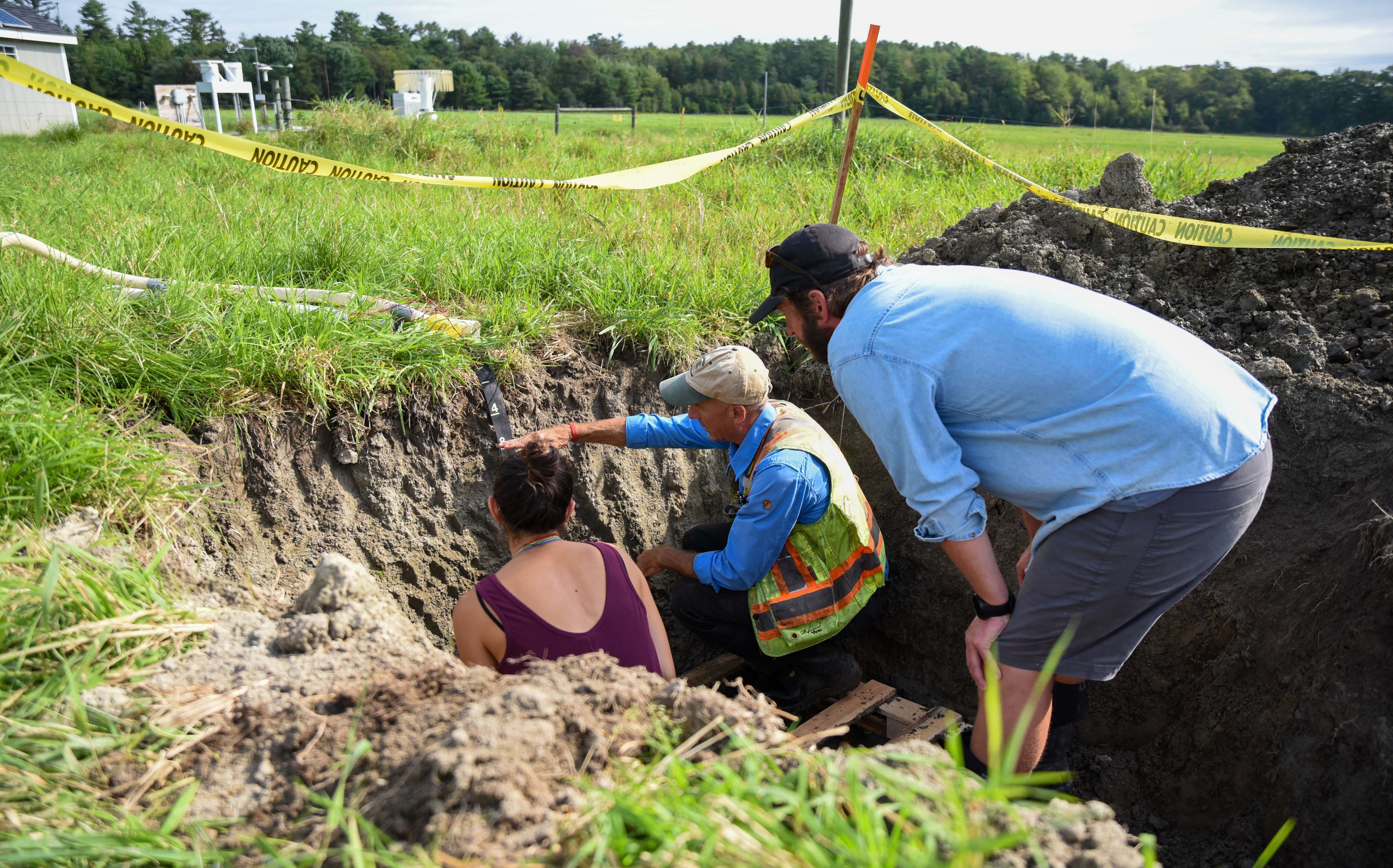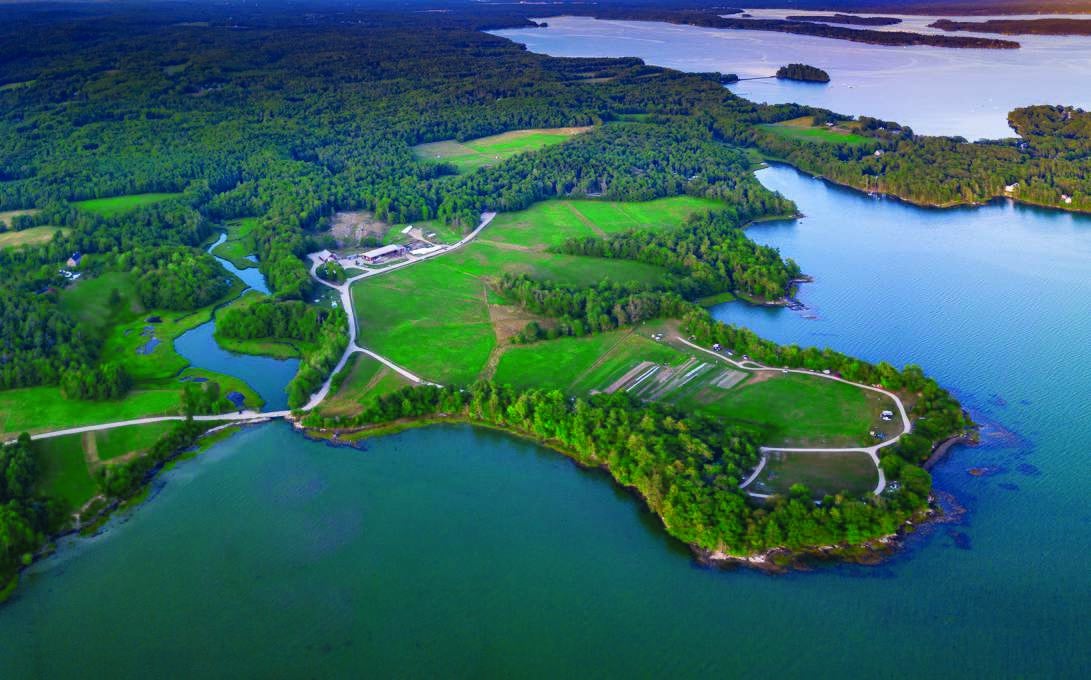
Freeport agriculture nonprofit to lead $35M rollout of ‘climate smart’ farming practices
Wolfe’s Neck Center for Agriculture and the Environment in Freeport was awarded up to $35 million in federal funds to support the adoption of climate smart agricultural practices on farms nationwide.
The grant came from the U.S. Department of Agriculture’s Partnerships for Climate Smart Commodities program. Wolfe’s Neck was one of 70 organizations chosen out of 1,050 that applied. It was the only Maine-based recipient.
It’s expected the center will finalize its budget for the initiative and its contract with the USDA later this fall, at which time the exact amount of the grant will be known, David Herring, executive director at Wolfe’s Neck, told Mainebiz.
Wolfe’s Neck will lead an alliance of over 60 organizations nationwide to launch the new initiative, which aims to incentivize farmers to use climate smart practices to produce commodities such as grain and dairy.
Open-source technology
The alliance includes national and regional buyers, funders and organizations. They will connect with farms and ranches in the Northeast, Colorado and the upper Midwest, and California to implement pilot projects. The alliance will train agricultural service providers, provide open-source technology, and develop a robust, accessible marketplace for climate-smart products.

The open-source technology was developed by Wolfe’s Neck and is called Open Technology Ecosystem for Agriculture Management, or OpenTEAM for short.
Wolfe’s Neck launched OpenTEAM in 2020 as the first open-source technology ecosystem in the world to address soil health and mitigate climate change.
“This project and the many others funded through this program are a positive step forward on making agriculture a solution to climate change,” said Herring. “The transition to and implementation of climate smart agricultural practices is one that we are deeply committed to supporting — here in Maine, New England and across the U.S.”
OpenTEAM is designed to provide land stewards, farmers and ranchers with soil health planning and technical assistance to access financing for practice implementation such as cover cropping, managed grazing or no-till planting.
Cover crops
“Climate smart” practices in the agricultural context, Herring said, pertain to farming and ranching techniques that mitigate climate change.
For example, after a harvest, planting cover crops such as oats or barley mitigate soil erosion and runoff, provide photosynthesis that absorbs CO2 and, in the spring, can be tilled back into the soil as a kind of “green manure.”
“These aren’t new practices,” Herring said.
The project encompasses California for rice production, Colorado and the upper Midwest for grain, and the Northeast for dairy.
The network of partners will provide farmers with technical assistance and support them with OpenTEAM to help them measure, verify and report outcomes. Additionally, the grant will be used to pay farmers to implement climate smart practices.
“The budget is still waiting to be finalized, but our hope is to pay farmers up to $20,000 over five years,” Herring said.
Wolfe’s Neck developed OpenTEAM as part of a movement to develop new tools and technologies, such as soil testing techniques and satellite imagery, that can help farmers understand the outcomes of their practices.
“It’s about democratizing that access,” he said.
He added, “We understand that the challenges we’re facing as a country and globally requires collaboration on a scale we’ve never seen before in agriculture.”
It’s expected participating farmers will represent approximately 1 million acres of farmland.
The project is expected to launch in 2023. Later this year, Wolfe’s Neck plans to post at least three new job positions associated with the project, with several more to come over the five-year period. Work to develop the partnerships began earlier this year. The project leader will likely be located at the Wolfe’s Neck campus in Freeport.
Key organizational partners include Point Blue Conservation Science, Zero Foodprint, Pasa Sustainable Agriculture, American Farmland Trust, the Organic Trade Association, Oregon Tilth, California Certified Organic Farmer, Field to Market, and Carbon A List as well as many regional, market and technical partners.
The initiative is part of the USDA’s $2.8 billion investment in 70 projects.
Foragers and apprentices
Wolfe’s Neck started as an organic beef operation in the 1950s owned by LMC and Eleanor Houston Smith, summer residents from Philadelphia. In 1985, the farm was given to the University of Southern Maine. In 1997, Wolfe’s Neck Farm Foundation assumed management of the farm as a nonprofit community resource.

The 626-acre campus includes coastal farmland, forest, trails, livestock education barns, an oceanfront campground, and historic structures.
The nonprofit provides farm-based education, research and a visitor center. It sees 30,000 to 40,000 visitors and hosts dozens of events each year. The campground is a primary draw. Its largest educational program is a farm-camp program that draws 800 children each summer and immerses them in agriculture and ecology, through activities such as clam digging and foraging for mushrooms. There’s also a residential organic dairy apprenticeship program.
“We like to say we’re connecting with kindergartners and the general public all the way through workforce development for aspiring farmers,” Herring said.
In 2019, Wolfe’s Neck completed a new facility to house the first-of-its-kind training program for new and transitioning organic dairy farmers.
It now has a new $4 million research facility – called the Smith Center for Education and Research — about three-quarters complete.
The 7,500-square-foot center will house Wolfe’s Neck’s growing suite of educational programs and research initiatives, as well as community events and conferences.










0 Comments